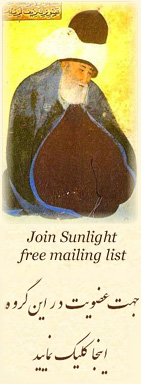This week, Sunlight is offering a series of poems in memory of
the passing of Rumi from earthly life, and specifically focused on
his teachings on the subject of mortality. Here, Ghazal (Ode) 911 is
offered, in a translation by Nader Khalili, in a version by Jonathan
Star, and in a translation by A.J. Arberry.
For more information on "Urs", the wedding, Sunlight suggests a
visit to
http://www.dar- al-masnavi. org/wedding- night.html
^ ^ ^ ^ ^
when i die
when my coffin
is being taken out
you must never think
i am missing this world
don't shed any tears
don't lament or
feel sorry
i'm not falling
into a monster's abyss
when you see
my corpse is being carried
don't cry for my leaving
i'm not leaving
i'm arriving at eternal love
when you leave me
in the grave
don't say goodbye
remember a grave is
only a curtain
for the paradise behind
you'll only see me
descending into a grave
now watch me rise
how can there be an end
when the sun sets or
the moon goes down
it looks like the end
it seems like a sunset
but in reality it is a dawn
when the grave locks you up
that is when your soul is freed
have you ever seen
a seed fallen to earth
not rise with a new life
why should you doubt the rise
of a seed named human
have you ever seen
a bucket lowered into a well
coming back empty
why lament for a soul
when it can come back
like Joseph from the well
when for the last time
you close your mouth
your words and soul
will belong to the world of
no place no time
-- Translation by Nader Khalili
"Rumi, Fountain of Fire"
Burning Gate Press, 1994.
~~~~~~~~~~~~ ~~~~~~~~~ ~
On that final day
When my casket moves along
Do not think my soul
will stay in this world.
Do not weep for me, crying, Tragedy, tragedy.
You will only fall into the snares of delusion –
Now that's a tragedy!
When you see my lifeless body go by
Do not cry out, Gone, gone.
It is my moment of union.
It is when I come upon
the eternal embrace of my Beloved.
As I am lowered into the ground
Do not say, Farewell, farewell.
For the grave is but a veil
covering the splendor of Paradise.
Having seen the fall
Consider the rise.
What harm ever came to the setting Sun or Moon?
What appears to you as a setting
is for me a rising.
What appears to you as a prison
is for my soul an endless garden.
Every seed that enters the earth will grow.
Should it be any different with a human seed?
Every bucket that is lowered into a well comes up full.
Should I complain when instead of water
I pull up Joseph himself?
Do not look for your words here,
look for them over there.
Sing to me in the silence of your heart
and I will rise up
to hear your triumphant song.
-- Jonathan Star
"Rumi - In the Arms of the Beloved"
Jeremy P. Tarcher/Putnam, New York 1997
~~~~~~~~~~~~ ~~~~~~~~~ ~
On the day of death, when my bier is on the move, do not
suppose that I have any pain at leaving this world.
Do not weep for me, say not "Alas, alas!" You will fall into
the devil's snare – that would indeed be alas!
When you see my hearse, say not "Parting, parting!" That
time there will be for me union and encounter.
When you commit me to the grave, say not, "Farewell, fare-
well!" For the grave is a veil over the reunion of paradise.
Having seen the going-down, look upon the coming-up; how
should setting impair the sun and the moon?
To you it appears as setting, but it is a rising; the tomb appears
as a prison, but it is release for the soul.
What seed ever went down into the earth which did not grow?
Why do you doubt so regarding the human seed?
What bucket ever went down and came not out full? Why
this complaining of the well by the Joseph of the spirit?
When you have closed your mouth on this side, open it on
that, for your shout of triumph will echo in the placeless air.
-- Translation by A.J. Arberry
"Mystical Poems of Rumi 1"
The University of Chicago Press, 1968
The media:
http://tinyurl. com/wa2ln







No comments:
Post a Comment